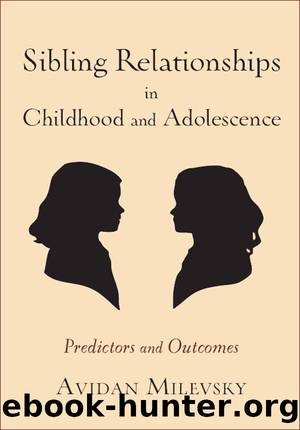Sibling Relationships in Childhood and Adolescence by Avidan Milevsky

Author:Avidan Milevsky [Milevsky, Avidan]
Language: eng
Format: epub
Tags: Social Science, Social Work, Psychology, Developmental, Child, Psychotherapy, Child & Adolescent, Children's Studies, General
ISBN: 9780231527934
Google: JZ44AAAAQBAJ
Publisher: Columbia University Press
Published: 2011-08-16T03:30:33+00:00
Several authors have noted the inconsistent and often contradictory results reported in the literature on the connection between parentâchild relationships and the relationship that a child develops with a sibling. However, based on a review of the empirical and clinical studies examining congruous and compensatory processes, a unified approach may be suggested to distinguish between those studies proposing a congruous pattern and those studies suggesting a compensatory pattern (Bank 1992; Seginer 1998). Studies proposing a compensatory pattern of relationships have generally investigated this pattern utilizing samples experiencing extreme and adverse conditions, such as children in clinical settings with unavailable parents (Bank and Kahn 1982), children with depressed mothers (Dunn and Kendrick 1982), or individuals who have experienced extreme trauma involving parents (Bank 1992). These conditions have been shown to foster close sibling bonds. Under these adverse settings, or, as Kahn (1982) coined, a âvacuum of parental care,â children desperately need to depend on someone, and often siblings take on that role.
However, the congruous pattern of childâparent and sibling relationships has been found in studies utilizing samples that were representative of the general population. In these cases, when there is a disconnect between parents and children it is not a pathological detachment, and the need for a substitute support provider is less pressing. Additionally, in these normative samples, congruence and compensation may not necessarily be contradictory or mutually exclusive. Individuals may learn patterns of relationship interactions from parents that are used as the prototype of relationships, but at the same time compensatory processes may be triggered under certain circumstances.
Finally, the ability of siblings to compensate in cases of low parental support may be a function of family size. Tolan and McGuire (1987) suggested that in large families siblings mediate many of the family transactions between parents and children. This mediating role may contribute to the ability of siblings to buffer harmful parental relationships.
Download
This site does not store any files on its server. We only index and link to content provided by other sites. Please contact the content providers to delete copyright contents if any and email us, we'll remove relevant links or contents immediately.
Should I Stay or Should I Go? by Ramani Durvasula(7652)
The Lost Art of Listening by Michael P. Nichols(7492)
The Rosie Project by Graeme Simsion(6377)
Beartown by Fredrik Backman(5737)
We Need to Talk by Celeste Headlee(5608)
Ego Is the Enemy by Ryan Holiday(5413)
Hunger by Roxane Gay(4922)
Suicide Notes by Michael Thomas Ford(4820)
I Love You But I Don't Trust You by Mira Kirshenbaum(3859)
Mummy Knew by Lisa James(3686)
Not a Diet Book by James Smith(3410)
Crazy Is My Superpower by A.J. Mendez Brooks(3398)
Toxic Parents by Susan Forward(3283)
Girl, Wash Your Face by Rachel Hollis(3282)
The Complete Idiot's Guide to Coping With Difficult People by Arlene Uhl(3145)
The Social Psychology of Inequality by Unknown(3018)
Name Book, The: Over 10,000 Names--Their Meanings, Origins, and Spiritual Significance by Astoria Dorothy(2978)
The Hard Questions by Susan Piver(2967)
The Gaslight Effect by Dr. Robin Stern(2791)
